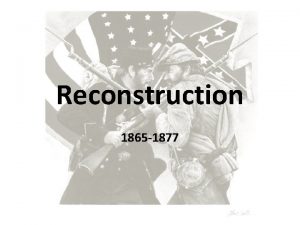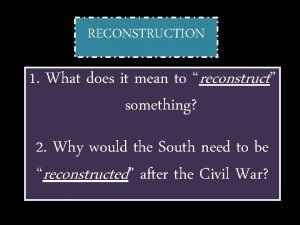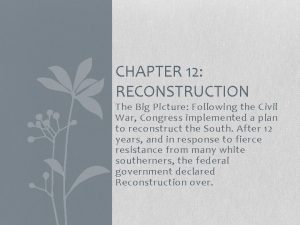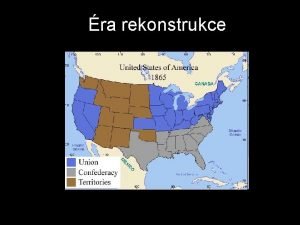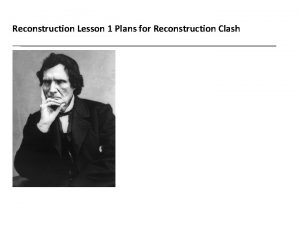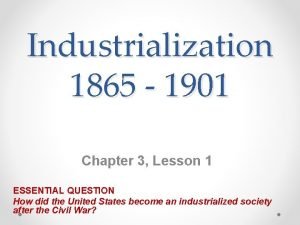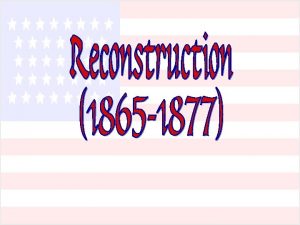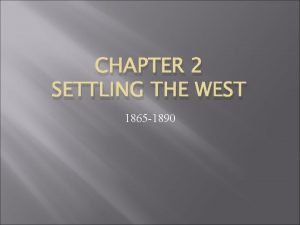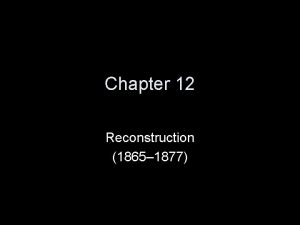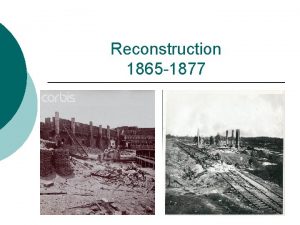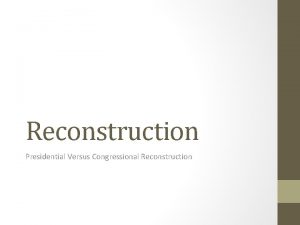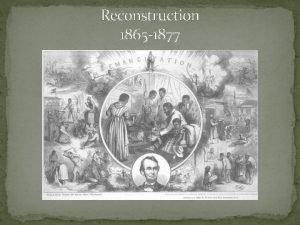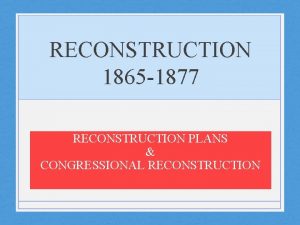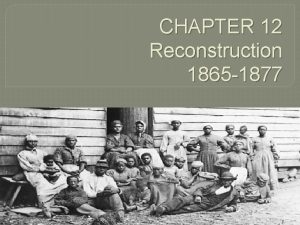Reconstruction Presidential Reconstruction 1865 66 Johnson sought to























- Slides: 23

Reconstruction

�Presidential Reconstruction: 1865 -66, Johnson sought to return states to prewar status with only slavery abolished �Congressional Reconstruction: Radical reconstruction, Congress challenged Johnson in 1867 & continued through Grants two terms in 1877 �Redemption: (by its defenders) began 1876 with Hayes election, ended involvement with S. affairs

Lasting Impact of Civil War • Harsh realities of modern war • South land & economy in shambles • Full emancipation • 11 th Amendment: States’ sovereign immunity • 12 th Amendment: Procedure for electing President & Vice President • 13 th Amendment: Abolishes slavery Neither slavery nor involuntary servitude, except as a punishment for crime whereof the party shall have been duly convicted, shall exist within the United States, or any place subject to their jurisdiction.

Plans for Reconstruction Clash • Reconstruction: 1865 -1877 • Rebuilding of the United States How do you reunite the Union? - What should be the political fate of the Confederate States? How do you rebuilt the S. Economy? -S. Share of nation’s wealth went form 30% to 12% How do you extend citizenship to African Americans? - 13 th freed slaves but didn’t give them full citizenship

Freedmen’s Bureau � Provided social, educational, and economic services as well as advice and protection to former slaves.

Black Codes in the South • Laws that sought to limit the rights of African Americans & keep them as landless workers • Limited occupations available • Some states prohibited form owning land • Vagrancy laws • Unemployed prison labor • Used violence & intimidation to enforce

Reconstruction Which plan was • Radical Republicans easiest former • Lead by Thaddeus Stevens & Charles Summer. Confederate states? • South committed crimes, had to pay Which was harshest? • Congress passed Wade-Davis Bill • 1864, majority of states’ voters had to swear loyalty, guaranteed African American citizenship… Lincoln vetoed

April 14, 1865

Andrew Johnson • Like Lincoln, wanted to restore S. political status asap • No interest in former slaves rights • Pardons & land to confederates who swore allegiance • Each state ratify 13 th • Resented wealthy planters • …had to write him a letter

Republican congress at odds with Johnson.

Civil Rights Act of 1866 • Congress’ attempt to overturn the Black Codes. • Created federal guarantees of civil rights • … Johnson vetoed • Johnson was defying Congress Freedmen’s Bureau - Johnson vetoes 1867, Civil Rights Bill - Johnson vetoes 14 th Amendment - Johnson opposes Congress Johnson vetoes 28 bills, 15 overridden impeaches him • Lost by 1 vote, Johnson promised to enforce Reconstruction Acts & did

• 1868, Republican former Union general Ulysses S. Grant elected President • His opponent won majority of the white vote • 14 th amendment: Guaranteed equality under the law for all citizens • 15 th amendment: Forbade any state from denying suffrage on the grounds of race, color, or previous condition of servitude.


Congressional Reconstruction • 1870, all former Confederate states met requirements under Radical Reconstruction & rejoined the Union • Republicans dominated new state governments • About 1500 African American men took roles in Southern state and local governments • Millions were now voters • Loyalty oath many white southerners couldn’t vote

Sharecropping � Independent labor � Incentive � Corruption entrepreneurs got share of crop for

Scalawags & Carpetbaggers • Republicans attracted African American southerners & those who sought change Scalawags • White Southerners who had been locked out of pre-Civil War politics by their wealthier neighbors, cooperated w/ freedmen & Northerners Carpetbaggers • Northerners who came to the South to improve their economic or political situations, or to help freedmen

Women & Reconstruction • Republicans did…not support women’s suffrage • Women found opportunities in medical facilities, orphanages & shaping the public school system Right to vote?

• • Public Schools Public schools grew slowly End of 1870 s, only about half of southern kids $$$ Southerners opted for segregation • Separation of the races • Radical republicans wanted integration • Combining the schools • Tax supported public schools was major Reconstruction success

Election of 1876 � Tilden won popular vote � Corruption with electoral vote �Compromise of 1877 � Federal troops removed from South � Officially ended Reconstruction � Lead to Redemption � Segregated South

Black Codes

Jim Crow Laws � Local laws enforcing racial segregation � Minstrel shows

• • • Economic Changes competition in South spark Violence Resentment The more progress African Americans made the more hostile white southerners became • Ku Klux Klan • Formed in Tennessee, 1866 • Burned homes, schools, churches • Beat, maimed, killed African Americans & their white allies • Aimed to scare freed people from voting • Focused on symbols of freedom (teachers, ministers, politicians, etc. ) … unfortunately succeeded

Federal Response • Racial violence grew in N & S • Congress passed Enforcement Acts • aka Ku Klux Klan Acts • 1870 & 1871 • Federal offence to interfere with citizen’s rights to vote • 1872, Klan violence decreased because of federal use of legal action • …Hatred would flare up in the coming decades
 Presidential reconstruction
Presidential reconstruction Presidential and congressional reconstruction venn diagram
Presidential and congressional reconstruction venn diagram Presidential and congressional reconstruction venn diagram
Presidential and congressional reconstruction venn diagram Reconstruction plans venn diagram
Reconstruction plans venn diagram Presidential and congressional reconstruction venn diagram
Presidential and congressional reconstruction venn diagram Presidential plans for reconstruction
Presidential plans for reconstruction Johnson & johnson swot
Johnson & johnson swot Jnj credo hotline
Jnj credo hotline Jjeds johnson and johnson
Jjeds johnson and johnson Johnson and johnson swot analysis
Johnson and johnson swot analysis Johnson and johnson organizational structure
Johnson and johnson organizational structure Johnson and johnson md&d
Johnson and johnson md&d Johnson and johnson three c's of classroom management
Johnson and johnson three c's of classroom management Johnson and johnson bcg matrix
Johnson and johnson bcg matrix Johnson and johnson botnet infections
Johnson and johnson botnet infections Brad and laurie johnson
Brad and laurie johnson Why did johnson and congress clash over reconstruction
Why did johnson and congress clash over reconstruction Andrew johnson reconstruction plan
Andrew johnson reconstruction plan Lesson 1 planning reconstruction
Lesson 1 planning reconstruction 1865 to 1900 inventions
1865 to 1900 inventions Industrialization (1865 to 1901 worksheet answers key)
Industrialization (1865 to 1901 worksheet answers key) 1877-1865
1877-1865 Settling the west 1865-1890
Settling the west 1865-1890 The rise of industrial america 1865-1900
The rise of industrial america 1865-1900
